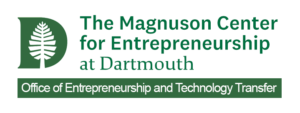A Better Type of Machine Learning
A Better Type of Machine Learning
Dartmouth alums Jonathan Fisher and Carla Emmons want to change the brains behind artificial intelligence.
“Jonathan saw a need in artificial intelligence and machine learning for a different approach and spent three years on his own doing research and development to achieve that new approach,” Carla, class of ’97, explains.
Jonathan, class of ’86, developed a technology called GoFish. When he explained it to Carla, whom he knew from Dartmouth, she was immediately impressed.
“I thought ‘Hey, that sounds really amazing. What can I do to help?’”
Together, Jonathan and Carla began making a business plan and reaching out to people who they knew from their previous work in the technology sector, as well as people in DEN’s Boston Chapter. Their company, Cognaisent, launched in January of 2018 and they were quickly joined by David Rudel, MA ’02, and Hugh O’Reilly, class of ’86, thanks to Dartmouth and DEN connections. This year, Cognaisent placed second in the 2019 Dartmouth Entrepreneurs Forum, hosted by the Magnuson Center for Entrepreneurship.
To understand what sets Cognaisent — and its GoFish technology — apart, you need a basic understanding of current artificial intelligence. First, neural networks, which guide most machine intelligence today, take in a huge amount of information and use that to guide their future identifications and decision making.
“You give them a bunch of data, you ask them a question, get an answer and that’s it,” Carla explains.
However, this model has three major issues. First, neural networks need a massive amount of information to train in order to achieve the ability to make correct identifications. Second, while they often reach the right answer, neural networks are black boxes: we don’t understand the process that got them to that answer, which can lead to misidentifications as well as perpetuation of hidden biases.
“[Neural networks] can’t tell you what factors in the data they used to provide the answer or even what logical chain they use to get there,” Carla says. “All the cats on the internet won’t train a neural network necessarily to identify cats as well as a human can.”
Third, and most concerningly, these shortcomings leave neural networks open to manipulation.
“They are easily spoofed,” Carla explains. “Changing just the right pixel in a picture can make the neural net misidentify a cat.”
As people become more reliant on artificial intelligence in potentially dangerous situations — like to guide self-driving cars or for law enforcement to identify suspects — they want to know that the technology is as close to infallible as possible. The current approach presents risks that people can readily see and imagine, which might prevent them from adopting or trusting the technology.
“While it’s often a very small risk, it’s a very tangible risk for most people,” Carla says.
GoFish takes a different approach to artificial intelligence, rather than training on massive data sets — like millions of picture of cats.
“It works more directly with the features of the data,” Carla explains. “For example, GoFish works with feature relationships directly so it can say ‘This is a cat and these are the specific features in relation to each other that led to that identification.’”
This makes the learning process faster and more foolproof. The implications for the technology are huge — it could be applied in a number of sectors — but for now Cognaisent is focusing on applying GoFish in pharmaceutical research and development.
“We expect, once we start branching out outside of healthcare and pharmaceuticals, that between robotics, autonomous vehicles and natural language processing, GoFish is going to become the pervasive machine learning platform,” Carla says.
Over the next five years Cognaisent will build out its offerings in the pharmaceutical industry before moving into other sectors.
Carla said that the positive reception at the Entrepreneurs Forum provided important validation that the technology has as much potential as she and Jonathan believe it does. The $10,000 prize money for second place will allow the company to hire an additional developer to accelerate the finalization of their prototype and product development.
Placing in the pitch context was especially meaningful since in 2018, Cognaisent applied but did not make it into the pitch contest at DEN’s Boston chapter. Despite that, DEN leaders helped them refine their pitch and focus on delivering the story first and foremost. Carla and Jonathan learned to first tell people why and how GoFish is going to change the world, then back that up with just enough technical detail. This year, that approach impressed the judges at the Entrepreneurs Forum.
“Coming in second, especially with such a strong showing from all the competitors, is just a great culmination to this pitch contest journey we’ve been taking for over a year,” Carla says.
Helping to refine the pitch is just one way that the Magnuson Center and the Dartmouth community of entrepreneurs has supported Cognaisent.
“Every time we go to an event we come out even more psyched not just about our product, but that we can do this and we can do it right and in a way that works for us from a business perspective and an ethical perspective,” Carla says. “One of the best things about the Magnuson Center’s events has been the infectious enthusiasm for entrepreneurship.”


